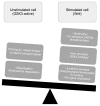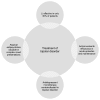Wnt and GSK3 Signaling Pathways in Bipolar Disorder: Clinical and Therapeutic Implications
- PMID: 28449557
- PMCID: PMC5426498
- DOI: 10.9758/cpn.2017.15.2.100
Wnt and GSK3 Signaling Pathways in Bipolar Disorder: Clinical and Therapeutic Implications
Abstract
The neurobiology of bipolar disorder, a chronic and systemic ailment is not completely understood. The bipolar phenotype manifests in myriad ways, and psychopharmacological agents like lithium have long term beneficial effects. The enzyme glycogen synthase kinase 3 (GSK3) has come into focus, as lithium and several other mood stabilizing medications inhibit its activity. This kinase and its key upstream modulator, Wnt are dysregulated in mood disorders and there is a growing impetus to delineate the chief substrates involved in the development of these illnesses. In May 2016, a comprehensive literature search was undertaken which revealed that there is over activity of GSK3 in bipolar disorder with deleterious downstream effects like proinflammatory status, increased oxidative stress, and circadian dysregulation leading to declining neurotrophic support and enhanced apoptosis of neural elements. By developing specific GSK3 inhibitors the progressive worsening in bipolar disorder can be forestalled with improved prospects for the sufferers.
Keywords: Bipolar disorder; Canonical Wnt pathway; Glycogen synthase kinase 3; Protein kinase B; Wnt; β-catenin.
Figures




Similar articles
-
Glycogen synthase kinase 3 substrates in mood disorders and schizophrenia.FEBS J. 2013 Nov;280(21):5213-27. doi: 10.1111/febs.12407. Epub 2013 Jul 15. FEBS J. 2013. PMID: 23796137 Review.
-
Inhibition of glycogen synthase kinase 3 by lithium, a mechanism in search of specificity.Front Mol Neurosci. 2022 Nov 24;15:1028963. doi: 10.3389/fnmol.2022.1028963. eCollection 2022. Front Mol Neurosci. 2022. PMID: 36504683 Free PMC article. Review.
-
The Wnt signaling pathway in bipolar disorder.Neuroscientist. 2002 Oct;8(5):497-511. doi: 10.1177/107385802237176. Neuroscientist. 2002. PMID: 12374432 Review.
-
A Low-Therapeutic Dose of Lithium Inhibits GSK3 and Enhances Myoblast Fusion in C2C12 Cells.Cells. 2019 Oct 29;8(11):1340. doi: 10.3390/cells8111340. Cells. 2019. PMID: 31671858 Free PMC article.
-
Glycogen synthase kinase-3 in the etiology and treatment of mood disorders.Front Mol Neurosci. 2011 Aug 9;4:16. doi: 10.3389/fnmol.2011.00016. eCollection 2011. Front Mol Neurosci. 2011. PMID: 21886606 Free PMC article.
Cited by
-
Glycogen Synthase Kinase 3: Ion Channels, Plasticity, and Diseases.Int J Mol Sci. 2022 Apr 16;23(8):4413. doi: 10.3390/ijms23084413. Int J Mol Sci. 2022. PMID: 35457230 Free PMC article. Review.
-
Significant reduction of long non-coding RNAs expression in bipolar disorder.BMC Psychiatry. 2022 Apr 12;22(1):256. doi: 10.1186/s12888-022-03899-y. BMC Psychiatry. 2022. PMID: 35410190 Free PMC article.
-
The genetics of bipolar disorder with obesity and type 2 diabetes.J Affect Disord. 2022 Sep 15;313:222-231. doi: 10.1016/j.jad.2022.06.084. Epub 2022 Jun 30. J Affect Disord. 2022. PMID: 35780966 Free PMC article. Review.
-
GSK3β: A Master Player in Depressive Disorder Pathogenesis and Treatment Responsiveness.Cells. 2020 Mar 16;9(3):727. doi: 10.3390/cells9030727. Cells. 2020. PMID: 32188010 Free PMC article. Review.
-
Psychosomatic Disorder: The Current Implications and Challenges.Cardiovasc Hematol Agents Med Chem. 2024;22(4):399-406. doi: 10.2174/0118715257265832231009072953. Cardiovasc Hematol Agents Med Chem. 2024. PMID: 37873912 Review.
References
Publication types
LinkOut - more resources
Full Text Sources
Other Literature Sources

